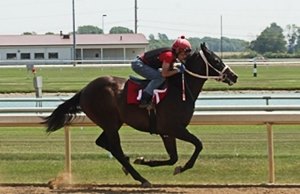ITOBA Sale Sees Improved Average, Looks to Future Goals


The selectivity of the Thoroughbred marketplace is a common refrain among the industry's major national auctions, but it also reaches into regional sales, where the impact can be even greater.
The effect on a small-market sale was on display Sunday during the Indiana Thoroughbred Owners and Breeders Association's 2-year-olds in training and horses of racing age sale, which struggled to get horses sold through the ring. Four of the 15 horses that were offered at Indiana Grand Racing & Casino changed hands at the fall of the hammer, which could prompt the sale's organizers to reconsider their strategy for the auction going forward.
"I think we've got a market that's very, very particular, just like it is anywhere else in the world," said auctioneer Duane Swingley, who is also ITOBA's vice president.
Swingley said representatives from the track's larger barns came to inspect the offerings and watched them during the under-tack show, but getting them to bid was a challenge. The auctioneer expected another six or seven of the horses to sell privately in the coming days, and this strategy may have deterred some buyers from raising their hands when the horses were in the ring, hoping to land them below their reserves after the fact.
"These guys are sharp," he said. "We're not dealing with a bunch of rookies. We're playing with hardcore people that buy horses on a regular basis, and I don't think most country auctioneers get that."
Looking to the future, Swingley listed two potential options that could improve the quality of future ITOBA in-training sales.
First, the auction could be moved to earlier in the calendar, even before the meet starts.
Under the current setup, horses in training can quickly be dropped into the active meets at Indiana Grand or other nearby tracks. However, the question could arise why a local owner is looking to move a young horse so close to their debut instead of running it themselves. Holding the sale earlier in the year could allow horsemen to buy and sell on potential, and allow buyers time to develop the young horses their own way.
Swingley said the second option would involve polling the potential consignors to get a rough estimate of how many horses might be cataloged to the sale. If the number was not satisfactory, the sale would be cancelled for the year.
"I think as a regional sale, we didn't have the numbers to bring in a very big crowd," he said. "Forty is what we wanted. If you have 40 horses, then we should have a cross-section that appeals to other buyers in other areas."
In terms of silver linings, Sunday's average sale price was over $10,000, which was nearly double last year's auction. Also, the sale's pair of $12,000 co-toppers drew higher bids than the $10,000 leader in 2017.
Keith Bode bought Explosive Storm, a 2-year-old American Lion colt out of the winning Proudest Romeo mare Explosive Dear. The Indiana-bred is from the family of grade 1 winner Dearest Trickski.
The partnership of Southwest Racing and Bruce Murphy bought the other high-priced juvenile, Diamond Line, an Indiana-bred Line of David filly out of the winning Pembroke mare Drippingindiamonds.
"We have a wonderful program here in Indiana," Swingley said. "We want people to come and buy farms, and buy horses, and raise horses, and develop our sire program. Hopefully we can find them and help them with the market here, and that's what our goals are."
